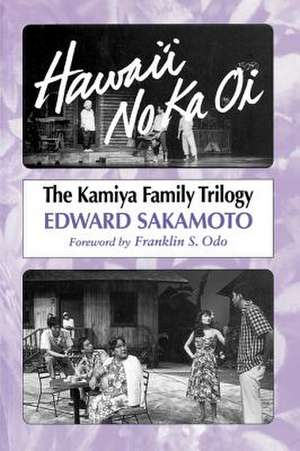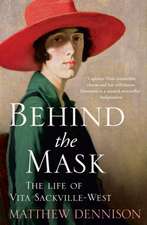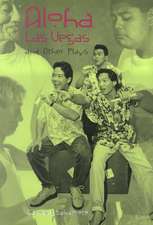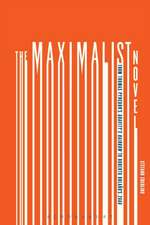Hawai'i No Ka Oi: The Kamiya Family Trilogy
Autor Edward Sakamoto Franklin S. Odoen Limba Engleză Paperback – 30 noi 1995
In The Taste of Kona Coffee, two nisei brothers, Aki and Tosh, fight to free themselves from the prison of old-world traditions and poverty only to find themselves bound by the constraints of neocolonialism. In Manoa Valley, set some thirty years later, Tosh, now a successful building contractor in Honolulu, must reconcile his image of the future with that of his son, Spencer, who dreams of life in mainland America. The third play, The Life of the Land, is set in 1980. Spencer has achieved his goals but at the cost of alienating himself from his family and his culture.
Hawaii No Ka Oi presents an important aspect of Japanese American social history in Hawaii, yet it reflects the immigrant experience of other ethnic groups. These are plays with which Americans of all backgrounds can identify.Preț: 167.53 lei
Nou
Puncte Express: 251
Preț estimativ în valută:
32.06€ • 33.47$ • 26.53£
32.06€ • 33.47$ • 26.53£
Carte tipărită la comandă
Livrare economică 05-19 aprilie
Preluare comenzi: 021 569.72.76
Specificații
ISBN-13: 9780824817268
ISBN-10: 0824817265
Pagini: 180
Dimensiuni: 153 x 230 x 11 mm
Greutate: 0.23 kg
Editura: University of Hawaii Press
ISBN-10: 0824817265
Pagini: 180
Dimensiuni: 153 x 230 x 11 mm
Greutate: 0.23 kg
Editura: University of Hawaii Press
Textul de pe ultima copertă
Hawai'i-born playwright Edward Sakamoto has created a substantial body of work that accurately and lovingly depicts the experiences of Japanese Americans in Hawai'i. This trilogy of plays traces the lives of four generations of the Kamiya family in the half-century between 1929 and 1980, from their beginnings as issei farmers in the coffee fields of Kona on the Big Island to their sansei and yonsei descendants, pondering the price of material success and assimilation. Sakamoto affectionately crafts the language of his characters to capture fully the flavor of speech used by Hawai'i's Japanese Americans. In The Taste of Kona Coffee, two nisei brothers, Aki and Tosh, fight to free themselves from the prison of old-world traditions and poverty only to find themselves bound by the constraints of neocolonialism. In Manoa Valley, set some thirty years later, Tosh, now a successful building contractor in Honolulu, must reconcile his image of the future with that of his son, Spencer, who dreams of a life in mainland America. The third play, The Life of the Land, is set in 1980. Spencer has achieved his goals but at the cost of alienating himself from his family and his culture. Hawai'i No Ka Oi presents an important aspect of Japanese American social history in Hawai'i, yet it reflects the immigrant experience of other ethnic groups. These are plays with which Americans of all backgrounds can identify.











